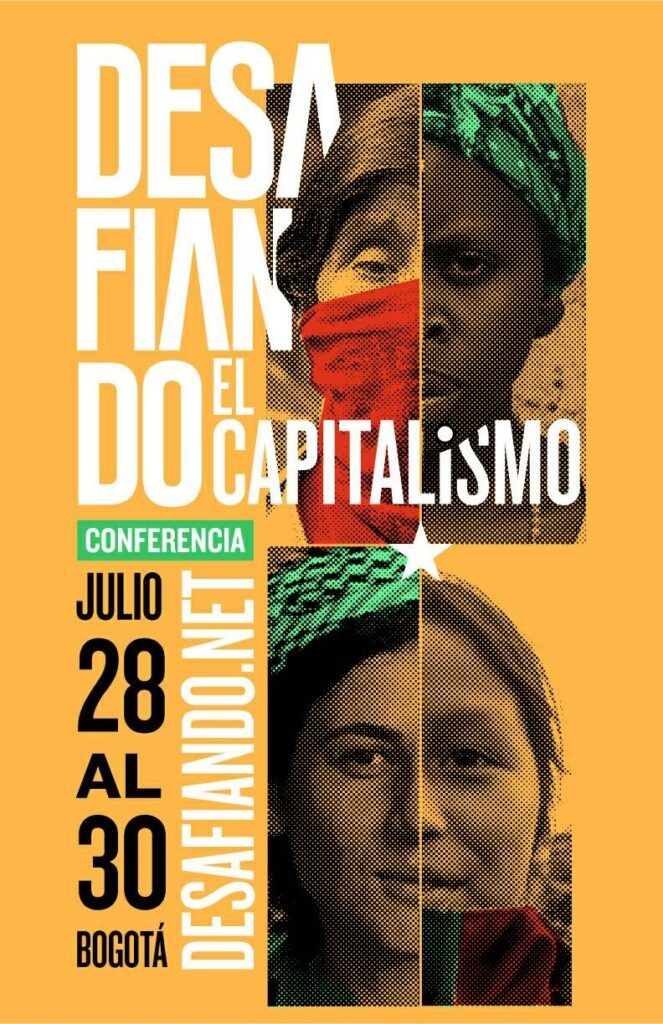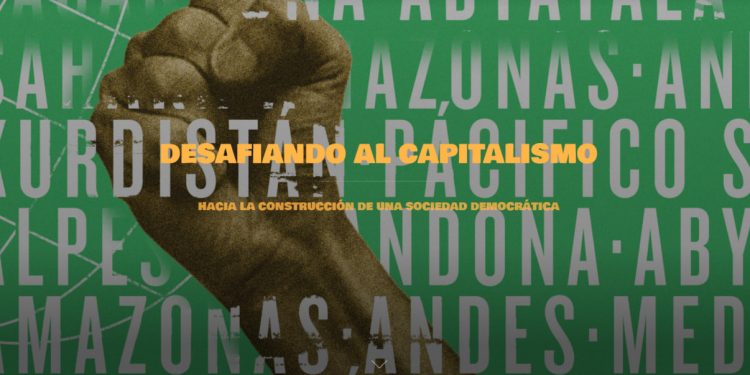NEWS CENTER – On July 28, 29 and 30, the international conference “Challenging capitalism towards the construction of a democratic society” will be held in Bogotá (Colombia), and also in online format, where various topics will be addressed, such as self-government , economy, ecology, women’s liberation and defense of life.
Below we publish the presentation of the conference made by the organizers:
How to live together in this world? That is the question that guides this initiative. Well, today it seems easier to imagine social collapse than the liberation of peoples. We need to put into dialogue the actions, paradigms, thoughts and ideologies of each region and each territory in order to nurture our emancipatory horizons at a global level. We agree that any profound and radical transformation of this society must have a clearly anti-capitalist, anti-colonial, anti-fascist, anti-racist and anti-patriarchal content.
We agree that capitalism led us to a crisis of civilization, and that is why we build alternative systems to the capitalist and state systems on a daily basis. We can call them Democratic Confederalism, Good Government, Good Living or Popular Power, we can agree or not on the terms and words used to name the enemy, or our strategic objective, those of us who will come together in this meeting are aware of rowing for the same side: revolution, communism, socialism, democratic modernity or, simply, liberation.

Our purpose is to expose our positions and concrete practices in order to identify the dilemmas, challenges, conflicts, limitations and potentialities. In this way, we seek to nurture critical thinking based on resistance and jointly strengthen our political action.
Capitalist modernity is the center and source of the multidimensional crisis we are witnessing. The trend was towards a new world-wide war and the social and ecological problems have been increasing exponentially over time. Capitalist modernity creates, organizes, sustains and promotes new and old forms of domination and oppression: colonialism, racism, xenophobia, imperialism, fascism and authoritarianism of different kinds. The role of speculative financial capital and mega-monopolies in contemporary society displaces and destroys people’s life projects.
The first crisis of capitalist modernity is ideological. The hegemony that has been established, in this sense, has been hit in many ways and has gradually entered a process of ineffectiveness and decomposition. Although ideological elements such as religious fundamentalism, nationalism, sexism, racism, colonialism and scientism continue to operate, the truth is that they have lost their initial functions in many ways.
The system of capitalist modernity stands on the shoulders of nation-states. Capitalist modernity does not solve the problems, because solving them would imply overcoming capitalism. Those of us who have been harmed by this system now face a great test. Consequently, it is urgent and inevitable to discuss alternatives and produce solutions against this hostile system to humanity and nature.

That is why we extend this invitation to a theoretical and political exchange that seeks to link, exchange and reflect on the experiences of historical and current situations lived and discussed in our territories on: resistance; borders, territorialities, autonomies and collective rights of the peoples; coexistence of native cultures; thoughts on modernity and de-coloniality; nationalisms, nation-states, progressive governments, institutional dispute, reflections on science, society and power; ideas and experiences on the sustainability of life, political ecology and community economy in the face of the global economic, humanitarian and health crisis; emancipatory theories and practices of women and anti-patriarchal struggles.
This conference is intended to be an opportunity to open dialogue between regions that are part of the “periphery” of the world, of the global south. Aware that this is not the first time that these initiatives have arisen, we hope that this space will allow us to clarify our revolutionary horizon and strengthen the political articulation between our organizations from the perspective of popular internationalism.
We are currently working on discussion tables made up of people from organizations whose objective is to plan the methodology and the discussions within the event. We hope you can join one of these tables and thus contribute to the coordination of this meeting.
All panels will be broadcast live and will have simultaneous translation in Spanish and English.
(1) Self-government
(2) Ecology and territory
(3) Economy and territory
(4) Women’s liberation and global struggle against patriarchy
(5) Dispute of ideas: communication and education
(6) Worldview: native peoples, ethnicity, spirituality
(7) State and democracy
Panel 1. Capitalism as a crisis of civilization
- Ana Biker, El Salvador – Latin American Political Table – Imperialist Dispute.
- Márgara Millan Moncayo, Mexico – Civilization crisis, social movements and prefigurations of a non-capitalist modernity .
- Jineolojî Academy, Kurdistan – Effects of the patriarchal and capitalist mentality on society and on women.
- Edgar Mujica, Colombia – CUT – View from the workers, on energy transition and crisis of capitalism in the environmental.
Panel 2. Alternative systems to capitalist and state systems (1st part)
- National Indigenous Congress, Mexico – The struggle for life, Zapatista Autonomous System
- Juan Carlos Jaime, Colombia – MODEP – Communist utopia and popular power. An alternative to capitalism and patriarchy.
- Kurdistan Women’s Movement – Women’s Global Confederalism and Life Without Patriarchy
Panel 2. Alternative systems to capitalist and state systems II (2nd part)
- Mayor Naka Mandinga, Colombia – PCN –
- Rud Rafael, Brazil – MTST TELAR –
- (confirm), Colombia – ONIC – Ecology and territory




